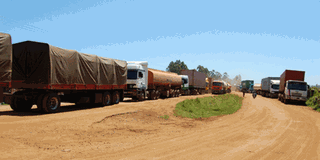Uganda begins to enjoy Comesa free trade benefits in July, says minister

Cargo trucks make their way into Uganda through the Malaba Border Point. Uganda is set to start benefiting from Comesa free trade zone this July. FILE PHOTO
What you need to know:
Benefits. Minister urges Ugandans to capitalise on the opportunities of the free trade zone.
Kampala.
Uganda’s exports to the 14 member countries of the Common Market for Eastern and Southern Africa (Comesa) free trade zone (FTA) will not attract import taxes beginning July, Mr David Wakikona, the minister of State for Trade, has said.
This development is as a result of the cries of the private sector, particularly manufacturers and traders whose goods would be subjected to at least four per cent tax, making it expensive to trade and compete in the large Comesa market.
Speaking last week at the central region public awareness workshop on FTA organised by ministry of Trade, Mr Wakikona said the country should not allow to be reduced to spectators but endevour to capture the opportunities that the Comesa free trade zone presents.
“In 2012 the cabinet approved our entry into the Comesa FTA. And beginning July this year we will start enforcement—benefiting from opportunities that come with being a member of the FTA, so don’t let that opportunity slip.”
According to theministry’s projections, some of the benefits that the FTA will present include increasing the country’s exports to Comesa by 50 per cent. At the same time, the competitiveness of the private sector is expected to go up given that the four per cent import duty which was being levied as import duty will be no more.
In an interview last week, the Commissioner for External Trade, Mr Silver Ojakol, said the move to join the Comesa FTA was informed by the demand by the private sector to tap the lucrative market with minimum or no restrictions at all.
Although private sector players are in agreement with the government regarding the benefits that the FTA will render, they are not entirely convinced that enough has been done to see the country favourably compete with the other member countries in equal terms.
Comesa: composition and contribution to uganda’s trade
The Comesa has 19 member states, of which 14 including; Burundi, Comoros, Djibouti, Egypt, Kenya, Libya, Madagascar, Malawi, Mauritius, Rwanda, Sudan, Swaziland, Zambia and Zimbabwe, are members of the Comesa Free Trade Area that was launched in 2000. Comesa has a population of approximately 467.6 million as of July 2011 and a combined GDP of $799.2 billion as of 2010, and is Uganda’s main export market, according to a statement issued earlier by the Minister of Trade, Amelia Kyambadde.
Over the last five years, Comesa has on average provided a market for 57 per cent of the value of Uganda’s exports annually, earning the country an average of $ 1.3billion (about Shs3.3 trillion) in export revenues every year.
And according to Trade minister Amelia Kyambadde, the decision to join the Comesa free trade zone, is meant to consolidate and improve Uganda’s access to this huge and lucrative regional market.
History of COMESA
The history of COMESA began in December 1994 when it was formed to replace the former Preferential Trade Area (PTA) which had existed from the earlier days of 1981. COMESA was established ‘as an organisation of free independent sovereign states which have agreed to co-operate in developing their natural and human resources for the good of all their people’ and as such it has a wide-ranging series of objectives which necessarily include in its priorities the promotion of peace and security in the region.
cap;Cargo trucks make their way into Uganda through the Malaba Border Point. Uganda is set to start benefiting from Comesa free trade zone this July. FILE PHOTO
Govt urges on local innovations with business models
Innovators urged to engineer inventions in the local context.
BY FREDERIC MUSISI
[email protected]
Kampala.
The 4th edition of the Annual Communications Awards (ACIA) came to a finale last week at a glitzy ceremony in Kampala with government pledging more support for Information and Communication Technologies for Development (ICTD) innovations.
The awards, organised by the Uganda Communications Commission (UCC), were launched in 2010 with the objective of promoting and recognising innovations in the ICT sector by everyone in the country.
Eight innovations from eight categories were recognised and awarded at a gala organised by UCC in conjunction with Monitor Publications Limited (MPL) and telecommunications companies, MTN, Airtel and Huawei technologies.
The winners were; Drug Management Applications which eases drug access in rural areas; Barefoot Law which helps rural communities access legal services; Breast IT which detects breast cancer, Walk Track which eases movements for the visually impaired and Salam student which eases access to information at universities (specifically, Islamic University in Uganda).
Others were; E-Signature by DHL and the tourist guide application-Pearl Uganda Guide. The winners were awarded with both cash prizes and accolades while first runner-ups received mentions and cash prizes.
The chief guest, State minister for ICT, Nyombi Thembo, applauded the innovations and stressed the need of localising (putting them in a homegrown framework) so they can have wider reach and usage.




